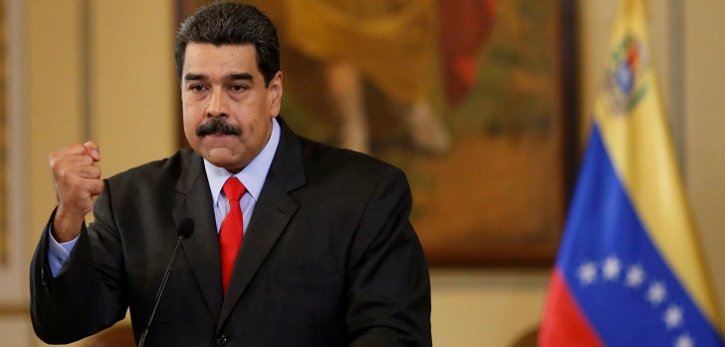Venezuela, before the abyss: new elections to get stucked in the baseline
Next Sunday, the South American country will vote with the illusion of giving an important spur to its economic and social history.

Venezuela faces its own destiny. Current president Nicolás Maduro aspires to revalidate his mandate this Sunday, in the midst of an election in which three other candidates have also registered: Reinaldo Quijada, from the Unidad Política Popular 89 party; Henri Falcón, from Avanzada Progresista, and Javier Bertucci, of Esperanza por el Cambio.
The South American country is preparing to live a crucial day for its future, since the opposition is torn between abstaining or voting for Falcón or Bertucci, which would allow to take power away from Maduro. The National Assembly, which has an opposition majority, hasn’t been able to do anything to neutralize Maduro's government and, rather, has asked the population not to vote in a process that they consider an electoral fraud.
At present, Venezuela’s situation is critical. Twenty years of Bolivarian revolution keep the country under intensive therapy, with forecasts continuing to be discouraging. The International Monetary Fund (IMF) anticipates that the Venezuelan economy will continue to plummet, with a 15% drop of the Gross Domestic Product (GDP) for this year, and an inflation rate that will exceed 10,000%.
The IFM expects that Venezuela’s GDP will shrink 15% in 2018
The situation is set to be repeated in 2019, with a contraction of 6%, as a direct consequence of the collapse of production and oil exports, the main source of foreign currency in the country, as well as the consumption fall.
Household spending in Venezuela Expenditure hasn’t increased despite the minimum wage raises that Maduro has approved in recent months. On April 30, the president decreed an increase of 60% of the monthly minimum wage, until 65,021 bolivars, equivalent to about 90 dollars, according to the highest official exchange rate (717 bolivars per US dollar).
However, none of this has been able to appease the debacle of a country that, according to the IMF, has been suffering an economic and humanitarian crisis since 2014, which couldn’t be fought with the oil-prices rebound.
Grupo David and Phoenix kick-started operations in Venezuela, but soon moved their offices to Panama
Protectionist policies have also been one of the hallmarks of the Bolivarian Government. In 2013, when Hugo Chávez died, Venezuela adopted a new customs tariff that included common descriptions and tariff rates of Mercosur members. However, special tariff codes for sensitive goods were reserved for more than 700 products, in order to protect Venezuelan’s steel, metalworking, textiles, footwear and plastic industries.
In the booming years, Venezuela gave birth to several local fashion groups, especially distributors of foreign brands or shopping centre developers. Founded in the late eighties, Grupo David holds licenses of companies such as Victoria’s Secret, Clarks or American Eagle Outfitters.
The group’s first steps were given jointly with Adidas, a brand that Grupo David distributes today in Venezuela, the Dominican Republic and some Caribbean islands such as Trinidad and Tobago or Jamaica. Grupo David’s business also extends to Latin American countries such as Guatemala, Panama, Colombia, Costa Rica and El Salvador. The firm also operates in the shopping centres’ business with 55,000 square-meters facilities in Margarita.
Despite having its origins in Venezuela, Grupo David is now a Panamanian company, since they had to move their headquarters to the country due to the economic situation in their domestic market.
Inditex operates with 22 stores of Zara, Pull&Bear and Bershka in Venezuela
Another Venezuelan company that followed in the footsteps of Grupo David was Phoenix, Inditex’s partner in Panama, the Dominican Republic and Venezuela. Phoenix, headquartered in Panama City, has also the licenses of foreign brands like Timberland, Helly Hansen, Rollerblade, Dakine, Ogio, Led Lenser and Garmin, and is a shareholder of Spanish men’s label Scalpers since 2015.
Sambil is the only Venezuelan fashion-related giant that still maintains its operations in the country. Founded in 1958, the company owns thirteen shopping centres in Latin America, most of them situated in its local market. Venezuela’s economic context has led Grupo Sambil to boost operations abroad: it opened in 2017 its first facilities in Spain and is developing a new mall in Puerto Rico.
Difficulties in cashing orders and achieving profitability has led more than five hundred companies to suspend exports to Venezuela in recent years. Some fashion giants have reduced their foothold in the South American country. At the end of fiscal 2017, Inditex operated in Venezuela with 22 stores, two less than in the previous year. The Spanish retailer is present in the Venezuelan market since 1998 and currently, it’s established with the Zara, Pull & Bear and Bershka chains.
Difficulties in cashing orders and achieving profitability has led more than five hundred companies to suspend exports to Venezuela
Brazilian shoemaker and retailer Alpargatas exited Venezuela at the end of 2016. The company, owner of flip-flop brand Havainas, stopped marketing its products in the country due to non-payments.
Despite political uncertainty and the severe crisis suffered by Venezuela, some fashion companies keep up their expansion plans in the country. For instance, Spanish group Tendam (formerly Grupo Cortefiel) opened a store with the Springfield in the city of Valencia and currently runs six shops in the country.
American giant Skechers inaugurated in the same town a shop last November. Another footwear group that bet on Venezuela was Payless, which opened a point of sale on the island of Margarita and plans to grow in Maracaibo.


info@themds.com
Validation policy for comments:
MDS does not perform prior verification for the publication of comments. However, to prevent anonymous comments from affecting the rights of third parties without the ability to reply, all comments require a valid email address, which won’t be visible or shared.
Enter your name and email address to be able to comment on this news: once you click on the link you will find within your verification email, your comment will be published.